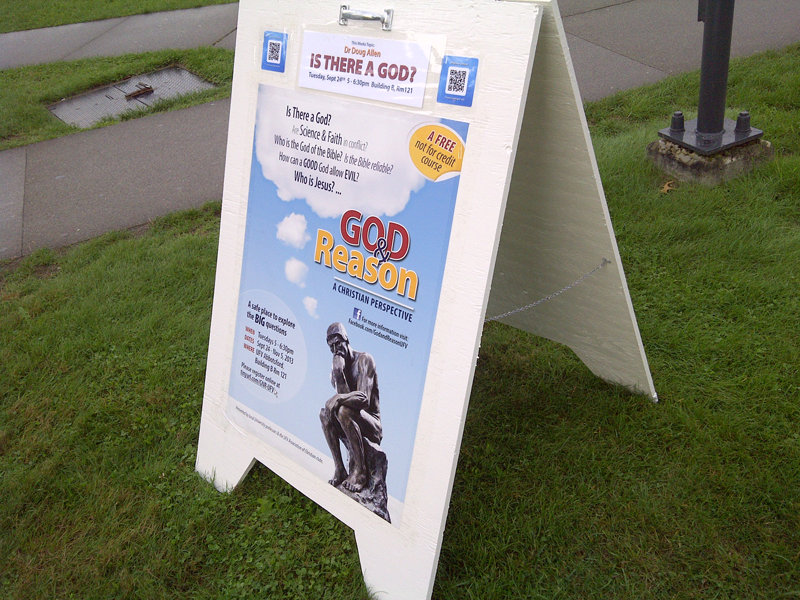Print Edition: September 25, 2013
I noticed the sandwich boards appear about a week ago.
It’s not a new form of advertisement on campus – two-piece painted plywood structures pop up near the library or under the breezeway on a semi-regular basis, offering information on a variety of events ranging from the annual blood drive to career fairs, community meals, and dodgeball on campus.
The sandwich boards that appeared this week, however, are different. They’re larger.
They boast a poster that looks professionally designed and printed – a far cry from the usual fare of rushed handwriting and simple arrows. These sandwich boards advertise seven nights of religious discussion, titled “God and Reason,” starting this week and running every Tuesday night until the end of November.
The difference that caught my eye, however, was a prominently-placed bubble of text at the top of the sign which read—and this wording is important—a free, not-for-credit course.
I have absolutely no problem with the content of these events; questioning, discussing, and learning about religion is a vital part of maturing and growing as a person. University exists to facilitate discussion.
What I take offense to is the fact that the organizers are advertising “God and Reason” as a course. A speaker series? Sure. A lecture series? Sure. But a course?
A variety of free courses are offered through community centres and in church basements year-round, but that’s another sort of course entirely – away from a university environment, the definition of “course” doesn’t indicate the same quality. A typing course offered as a community service has an entirely different reputation than a course offered as part of a post-secondary education. Placing a community course (if that’s how we’re going to look at this speaker series) on campus is nothing short of misleading; the context of a university campus lends it credibility and authority it does not have or deserve.
Attending a class in a university setting comes with a guarantee about the class, the content, and the instructor. UFV has reams of policy that describe in minute detail how classes are created, vetted, and eventually offered, not to mention the necessary credentials of the professor.
This is the second detail I take issue with; the posters advertise professor Dr. Doug Allen of SFU, who will lead the first event. It sounds impressive: Dr. Doug Allen of SFU. But Dr. Doug Allen is not a professor of religious studies nor even a professor of political science, a department that sometimes includes religious studies. Dr. Doug Allen teaches economics – from the look of his academic webpage at SFU, dealing largely in transactional economics. While his credentials are impressive, there is no evidence that Dr. Doug Allen has the expertise in religious philosophy necessary to teach a “course” in it.
Before coming to UFV “God and Reason” was held at SFU, organized by religious student groups analogous to those helping organize it here. The “course content” is the same – asking a central question each night the series is held. But there is no indication either at UFV or at SFU of where this content came from or who created it. I highly doubt the lecture material was vetted by a committee, as UFV policy states course content must, before being presented to students.
The bottom line, for me, comes down to this: “God and Reason” presents itself as a course without any credentials to back it up. The choice of instructor seems more closely connected to their personal religious views than their areas of expertise, and it’s painfully obvious that the course material (available online in Powerpoint format through Allen’s SFU page) hasn’t been critically reviewed in an official capacity by anyone other than the organizers.
If UFV students are looking to take a course in Christian material, one is available in the form of Religious Studies 303: the Christian Tradition. It was offered last year, and according to the semi-repetitive pattern of the UFV timetable it will most likely be offered again in the 2014/15 or 2015/16 school year.
Time is one of the most precious commodities at any student’s disposal; if we’re already at university, I think it’s safe to say there is no longer a need to take community courses. Save your curiosity for a course and a professor equipped to answer your questions and accredited to teach you in the first place.


